Law School Grads Urged to Put Their Training to Work After ‘Hard Year’
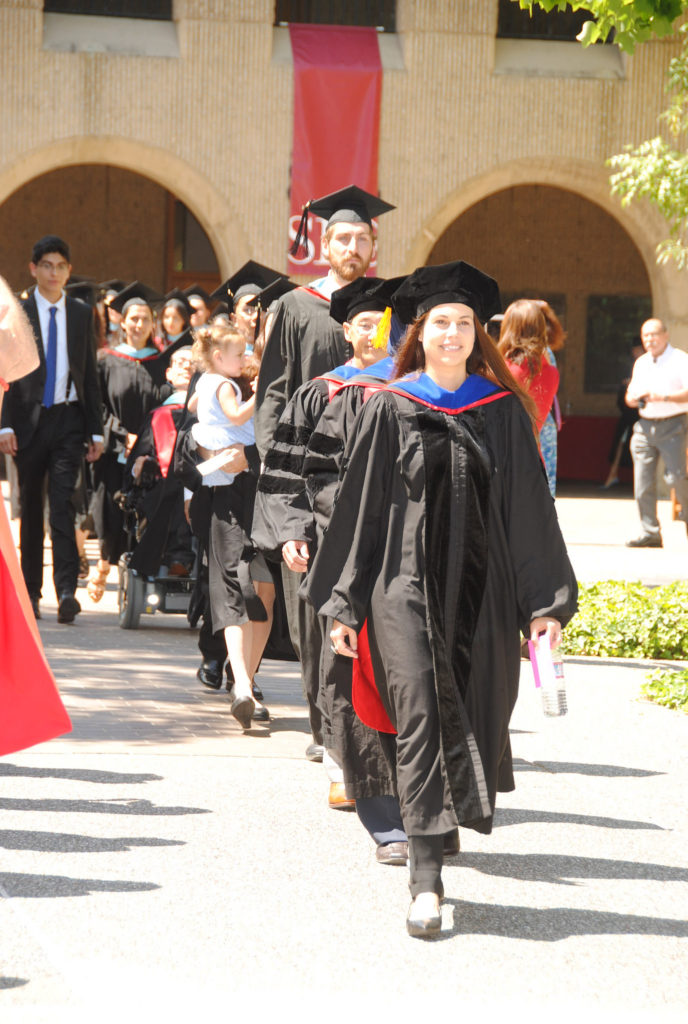
In her charge to the Class of 2015 at Stanford Law School’s graduation ceremony on Saturday, June 13, Dean M. Elizabeth Magill readily acknowledged, “This has been a hard year,” but she found reasons for optimism in the students receiving their degrees as she greeted the crowd of around 1,500 gathered in Canfield Courtyard.
She began by welcoming the parents and friends of the 192 students receiving doctor of jurisprudence (JD) degrees and the 75 students receiving advanced degrees. “Thank you for helping make these graduates who they are, thank you for supporting them, and thank you for sharing them with us. They are inspiring and funny and skilled and kind and charming and memorable and talented and smart and wise – all at once. We have been privileged to teach them and we are bursting with pride to be able to call them our graduates,” said Magill, the Richard E. Lang Professor of Law.
Many of those students and the dean herself wore black stoles atop their graduation robes, printed with the “Black Lives Matter” theme of numerous events, classes and programs held at the law school during the past year. It was a topic all of the speakers mentioned, while urging the students to build upon the training, practical experience and sense of community they had shared at the law school in order to tackle the problems that dominated the news in 2014-15.
Barbecue Enthusiast
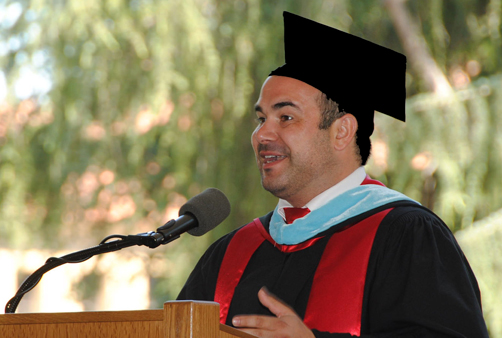
Pablo Acevedo Alvarez, LLM ’15, chosen by the international students to deliver remarks, emphasized the diversity of the international students receiving advanced degrees. “Our graduating class comes from 27 different countries, with different legal backgrounds, different areas of practice, knowledge and accents,” he said. He practiced law for 10 years in his native country, Chile, before fulfilling his dream of studying at Stanford Law School and brought with him a love of barbecuing that he shared with fellow students. They laughed as he recalled “in my country” conversations on topics such as “whether American light beer would qualify as beer in other countries, or what really constitutes a barbeque, an issue very important to me.”
On a more serious note, he said, “Stanford taught us that there are still many things to do in terms of equality, even here in the U.S., where we could see that discrimination and injustice are still living challenges. I invite you, my fellow classmates, to take this critical thinking back home and spread it. We were privileged to be here, and after graduation we have the unique opportunity to give back to the world. Remember that today we become ambassadors of Stanford Law School with our actions, and many eyes will be looking at us.”
First-Ever ‘WikiSpeech’
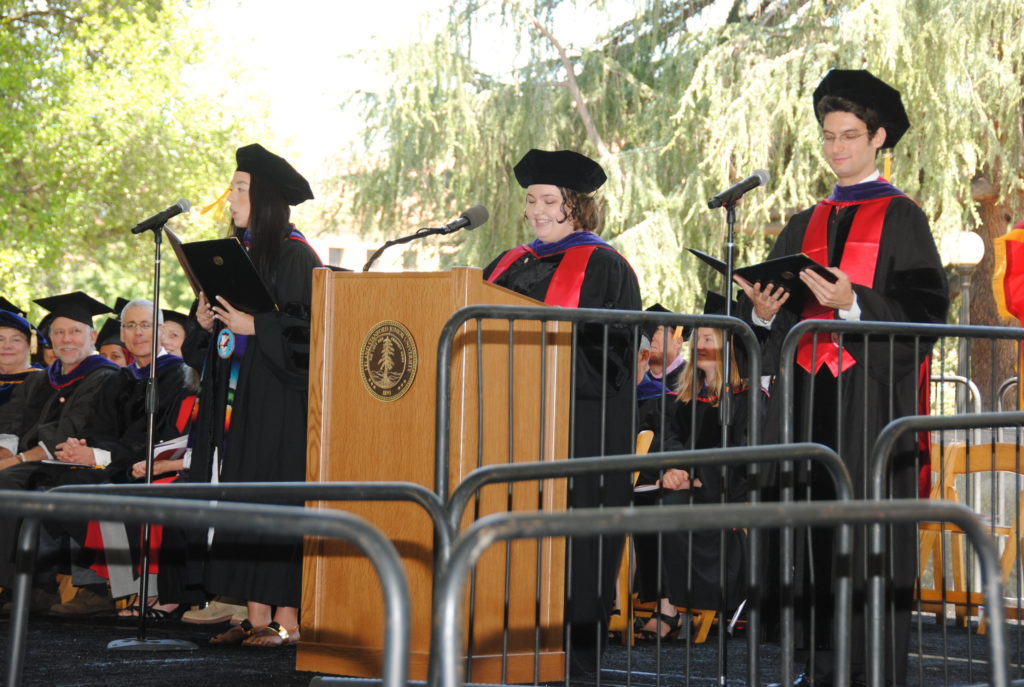
In their crowdsourced “WikiSpeech,” the JD Class of 2015 said, “We attended law school during some of the most important civil rights struggles of our time,” adding, “We saw the stark contrast of learning about justice in the classroom and, at the same time, feeling hopeless to remedy the injustice we were witnessing across the country and around the world – injustices perpetuated by the people and systems we entrust with upholding the law. Injustices perpetuated by the very system we are about to enter.”
Marta Belcher, JD ’15, said that the Class of 2015 voted to have the WikiSpeech because, “We couldn’t see why our graduation ceremony, in 2015, should be the same as it was for the Class of 1915. So, rather than choosing just one speaker to represent all of us, we decided instead to write this speech together as a class, using an online wiki that allowed all of us to contribute.” Belcher delivered the speech with two other law students who received their JD degrees that day, Michael Mestitz and Ashlee Pinto.
‘You’ve Made It’
The WikiSpeech noted that the Class of 2015 started at Stanford Law School with a professor congratulating them by saying, “You’ve made it.” “We thought we knew what he meant, looking around our sun-drenched campus filled with palm trees and beautiful buildings. Our future classmates were accomplished, if a little intimidating – veterans, educators, musicians, athletes, activists – people who never thought they would be here, and people who knew this was the plan all along. We had made it to Stanford and, we thought, maybe we could relax,” the students said.
But soon they “lost the outside world to casebooks, italicized commas, balancing tests and two spaces after a period.” As their legal training progressed, they began to find ways they could make change for others and set to work. Among their accomplishments were securing the release of clients who had previously received life sentences for petty offenses under California’s Three Strikes Law, protecting the rights of individuals to practice their faith, representing children to make sure they received an education that met their needs, providing tax assistance, helping families threatened with eviction, and advocating for immigration reform and other human rights.
“We understand now that three years ago, we ‘made it’ because we arrived at a place where excellence does not mean perfection, where ingenuity thrives and collaboration is encouraged. We made it because we had the opportunity to learn from the great minds of our time and put that learning to work to help our clients ‘make it,’ too. And we made it because we found this community that we in turn ‘made’ for each other,” the class said.
Awards Presented

Following the WikiSpeech, class Co-President John Casey presented the Dean’s Award for Excellence in Service to Stanford Law School to James Barton, then made a posthumous presentation of the Staff Appreciation Award to Paul Lomio, who was director of the Robert Crown Law Library until his recent death. Barton said, “The reason he is receiving this award is not just because he helped build a world-class library but also because he cared about us and let that show.” The award was accepted by the Lomio’s daughter, Rita Lomio.
Juliet Brodie, associate dean of clinical education, the Mills Professor of Law, and director of the Mills Legal Clinic as well as the Stanford Community Law Clinic, was presented the John Bingham Hurlbut Award for Excellence in Teaching, the first time a professor who teaches exclusively in the clinic has received this honor.
‘Excruciatingly Bad’ Year
In her address, Brodie said, “It’s been a tough year,” and she noted that one reason was the loss of Eric Garner, Tamir Rice, Michael Brown, Walter Scott, Freddie Gray and “literally countless, and uncounted, and unknown, people like them – people whose lives we honored together in December.” She said, “This felt like bad, bad news. And it is acutely bad, personally bad, excruciatingly bad, for all of us in law because these incidents call into serious question the legitimacy of our systems of government accountability, and thus our rule of law itself, as well as our progress on, what many, and certainly on what I think, is the foundational, unresolved issue of our nation.”
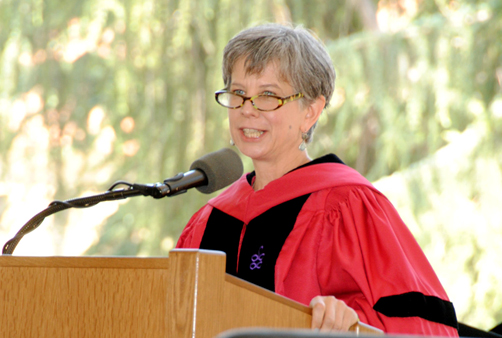
Other bad news for those who care about justice in America, the richest country in the world, she said, are income inequality, the highest poverty rate in recent memory and unequal access to justice. “The U.S. has one legal aid lawyer for every 6,400 low-income people, compared to one private lawyer for every 429 people who are not poor,” she said.
But there is good news, too, Brodie said. “You have chosen a profession that has service at its core, and equality and justice as its animating values, if not always its daily diet.” She explained, “Law, at its most basic, is the system by which we work out the tensions – sometimes dangerous tensions – inevitable from collective life, the system by which we balance private gain and public benefit, private freedoms and public commitments, by which we, with the consent of the governed, regulate private behavior and establish norms and parameters for peaceful pursuit of happiness.”
The other good news, she noted, is, “You are a remarkable bunch.” She recalled students who had worked long into the night in East Palo Alto, perfecting a brief to submit on behalf of a homeless person with mental illness and young lawyers who had stood up with children seeking a decent education and victims of horrible violence seeking asylum.
She offered inspiration from ancient Jewish teachings called the Mishnah, the Ethics of Our Ancestors, which teach: “You are not required to complete the task of repairing the world. But neither are you free to ignore it.”
Her last piece of advice was, “Don’t blink, because before you know it, 25 years will have passed, and young people will be asking you, ‘How did you decide to spend your career?’ Get your answer ready now, and then go do it.”
Dean’s Charge to the Class
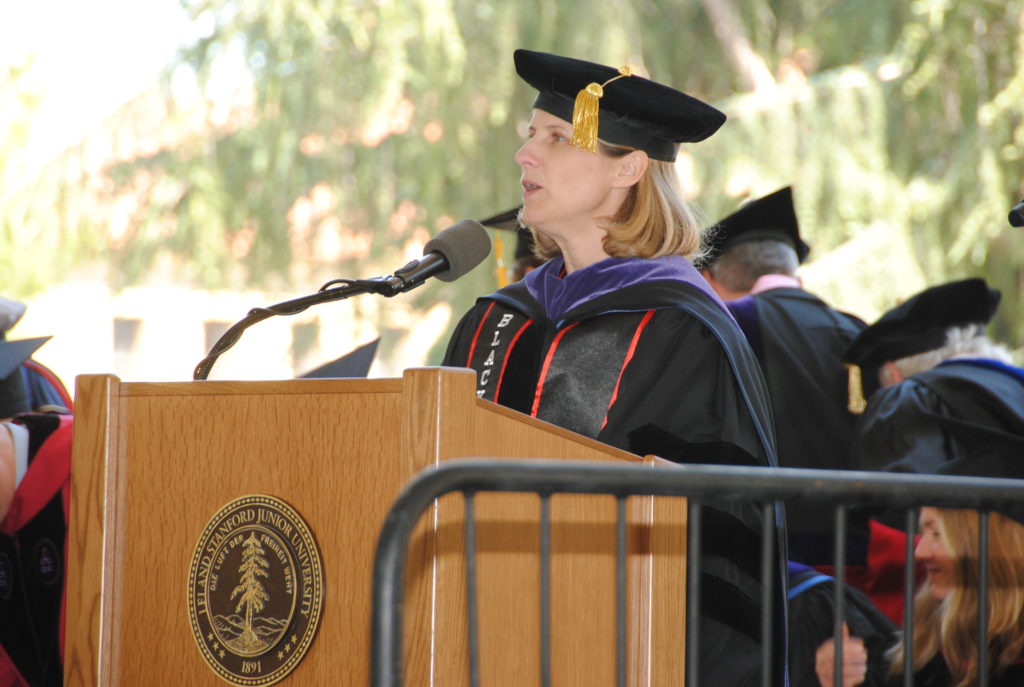
In her charge to the class, Dean Magill offered advice to those whose faith had been shaken by the year’s troubling events. First, she said, “Engage. It might be difficult, but you’ve got to get yourself to act. There are many ways to do it – participate, advocate for change, lead – and, given your education, you possess an amazing set of tools that give you a way of thinking and acting.”
Second, she advised finding a community, a connection with others. Referring to the history of “charges” in battles, she said you need “a group with a shared goal working together to accomplish a mission. For you, it could be a community of two, or a movement of thousands.”
Her third suggestion was to change the question: “If you lose hope, then look again at the problem. Is there another way of understanding it? Can you find a different piece of it to make progress? We have all had the experience of beating our head against the wall, failing to find the solution. And then we change something about our perspective – we talk to someone new, we change the focus, we learn of an unusual example, we think about it from the opposite perspective – and something emerges.”
Her own inspiration, the dean said, is the students themselves. “You have done every single one of these things, many times over, since you got here.” She explained, “In your time here, you have engaged like mad, you have created community worthy of charging the field, and you have taken a second (and third and fourth) look at everything. Some of you have taken these actions in the face of a real crisis of faith in the legal system.”
“When you joined us, I told you we picked you and recruited you because we knew you would change us for the better. And you have,” Dean Magill observed as her final thought to the graduates. “Keep doing what you have been doing here. I know you will. Now, get to it!”
View full transcripts of the speeches and photos from the ceremony here.
